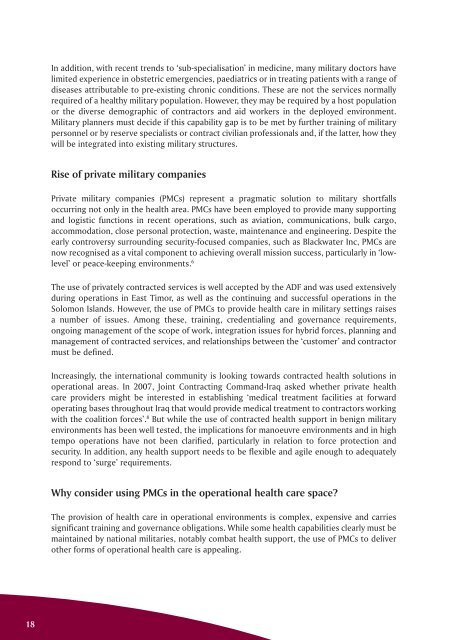ISSUE 182 : Jul/Aug - 2010 - Australian Defence Force Journal
ISSUE 182 : Jul/Aug - 2010 - Australian Defence Force Journal
ISSUE 182 : Jul/Aug - 2010 - Australian Defence Force Journal
You also want an ePaper? Increase the reach of your titles
YUMPU automatically turns print PDFs into web optimized ePapers that Google loves.
In addition, with recent trends to ‘sub-specialisation’ in medicine, many military doctors havelimited experience in obstetric emergencies, paediatrics or in treating patients with a range ofdiseases attributable to pre-existing chronic conditions. These are not the services normallyrequired of a healthy military population. However, they may be required by a host populationor the diverse demographic of contractors and aid workers in the deployed environment.Military planners must decide if this capability gap is to be met by further training of militarypersonnel or by reserve specialists or contract civilian professionals and, if the latter, how theywill be integrated into existing military structures.Rise of private military companiesPrivate military companies (PMCs) represent a pragmatic solution to military shortfallsoccurring not only in the health area. PMCs have been employed to provide many supportingand logistic functions in recent operations, such as aviation, communications, bulk cargo,accommodation, close personal protection, waste, maintenance and engineering. Despite theearly controversy surrounding security-focused companies, such as Blackwater Inc, PMCs arenow recognised as a vital component to achieving overall mission success, particularly in ‘lowlevel’or peace-keeping environments. 6The use of privately contracted services is well accepted by the ADF and was used extensivelyduring operations in East Timor, as well as the continuing and successful operations in theSolomon Islands. However, the use of PMCs to provide health care in military settings raisesa number of issues. Among these, training, credentialing and governance requirements,ongoing management of the scope of work, integration issues for hybrid forces, planning andmanagement of contracted services, and relationships between the ‘customer’ and contractormust be defined.Increasingly, the international community is looking towards contracted health solutions inoperational areas. In 2007, Joint Contracting Command-Iraq asked whether private healthcare providers might be interested in establishing ‘medical treatment facilities at forwardoperating bases throughout Iraq that would provide medical treatment to contractors workingwith the coalition forces’. 8 But while the use of contracted health support in benign militaryenvironments has been well tested, the implications for manoeuvre environments and in hightempo operations have not been clarified, particularly in relation to force protection andsecurity. In addition, any health support needs to be flexible and agile enough to adequatelyrespond to ‘surge’ requirements.Why consider using PMCs in the operational health care space?The provision of health care in operational environments is complex, expensive and carriessignificant training and governance obligations. While some health capabilities clearly must bemaintained by national militaries, notably combat health support, the use of PMCs to deliverother forms of operational health care is appealing.18

















